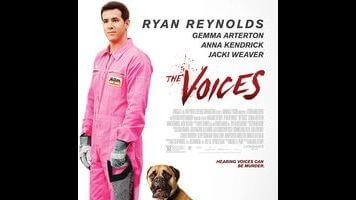Ryan Reynolds answers to The Voices in a schizophrenic horror comedy

Going unhinged is an important rite of passage for male movie stars, especially the ones looking to prove they’re as much serious actor as pretty face. To play crazy is to insist that you’ve got more to offer than God-given good looks, that you’re a risk taker ready to toy with your own image, that you’ve got a dark side you’re willing to indulge. Think of Jake Gyllenhaal, reaching new heights of intensity in last year’s Nightcrawler, or Brad Pitt, jabbering his way to an Oscar nomination with 12 Monkeys, or—to go really far back—Jimmy Stewart, twisting his leading-man decency into erotic obsession for Alfred Hitchcock’s Vertigo. Is there a showier, more effective way for an actor to establish his bona fides than by adding a madman to his resume?
One can now include Ryan Reynolds on that list of marquee studs who have found their inner depths by pretending to lose their marbles. In The Voices, Reynolds plays Jerry Hickfang, the budding Norman Bates of small-town Massachusetts. A perpetually cheerful go-getter at the local bathtub factory, Jerry seems just a little… off, from the moment we meet him. And sure enough, it isn’t long before he’s returning to his one-bedroom apartment to have long conversations with his pets; in the man’s deranged mind—and in Reynolds’ disguised voice—his mastiff is a dull cheerleader, his feline a violent instigator with a Scottish brogue. Jerry’s therapist (Jacki Weaver) encourages him to take his pills, but doing so is a catch-22: Only when on meds does he actually have to face the horrible things he does while off them.
What’s spooky, and convincing, about Reynolds’ performance is how free it is of affectation. Obliterating all traces of smug self-regard—the withering sarcasm that never withers, a signature move from his days as one of the guys in the pizza place—the actor plays Jerry as a guileless softie whose violence manifests itself chiefly through unfortunate “accidents.” So consistent is his portrayal of mental illness that it can’t help but throw the movie’s general inconsistency into sharper relief. The Voices wants it all ways at once, and while its severe shifts in tone are certainly bold (and intentional), they also prevent the film from properly functioning under any genre umbrella.
Early scenes, for example, create the expectation of a pitch-black comedy: A cheerful regional ditty plays over the opening credits, featuring animated images of falling blades and scampering house pets. There’s humor, too, however crude, in the one-sided dialogues Jerry carries on with his animal companions—and later, with the detached remains of his victims. At the same time, The Voices takes its hero’s crumbling sanity halfway seriously, especially once it gets around to a grotesque flashback designed to explain the origins of his lunacy. The psychology, alas, is as puddle-deep as the diagnoses issued in ’80s slasher movies. It’s like we’re watching a jokey remake of Maniac, minus all but a few drops of outré gore.
These hairpin swerves are (mis)handled by Marjane Satrapi, the graphic-novelist-turned-filmmaker behind Persepolis and Chicken With Plums. Her background is evident in some of the more stylized touches—a flutter of butterflies around Jerry’s British crush (Gemma Arterton), the pastel-pink splendor of the factory uniforms—and one wonders if this kind of genre-bending material might function better on glossy paper than the silver screen. As a movie, The Voices hits its mark only when playing the horror straight: A scene of Jerry’s smitten co-worker (Anna Kendrick) discovering the ugly truth about him is suspenseful and disturbing and sad in about equal measure, largely thanks to the casual menace of Reynolds’ controlled turn. Satrapi makes some bad calls in her attempts to balance bleak humor with bleaker thrills, including ending the film on a glibly cheerful note. Her best decision, bar none, was entrusting such heavy material to the guy who played Van Wilder. Behind that perpetual smirk lurks a talent for quiet depravity. Bonkers looks good on him.